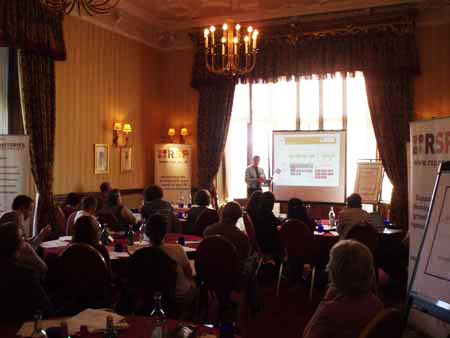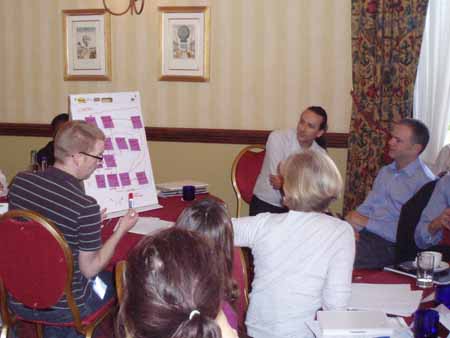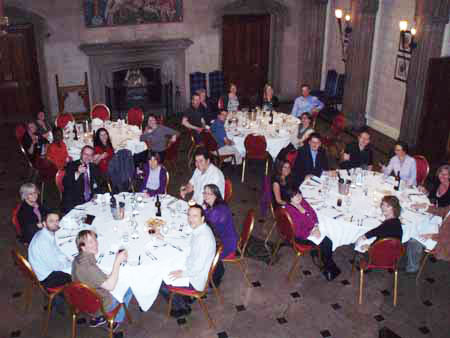The RSP Goes 'Back to School'
I recently attended the Back to School event [1] run by the Repositories Support Project (RSP)[2] at Matfen Hall [3], Northumberland, where I gave a workshop on metadata and also attended the second and third days of the event as a delegate. I was sorry not to be able to attend the sessions on the first day, but arrived in time for dinner so was able to meet the delegates and other presenters. I regretted not seeing the Minute Madness session, where delegates had a minute to talk about their repositories, particularly when I found out the winner, Rachel Henderson of the University of East Anglia, had done a repository rap! [4]
Dominic Tate of RSP had got together a great programme, designed around the feedback and suggestions of repository staff who had attended previous events so absolutely up-to-date with what was needed. In addition, the venue was just right, with good food and pleasant surroundings making for some relaxed networking opportunities, always an important part of any face-to-face event.
I ran my metadata workshop on the second day, getting people to describe objects using various flavours of metadata and then describing the same objects using free-style, collaborative tagging. The final exercise combined the two types of description in one record. The idea was to try and get people to think about what they are doing when they describe things, and also to think a bit more widely than just adopting one particular fixed approach and making objects fit! The delegates were an enthusiastic and welcoming audience and put a lot of effort and energy into the tasks. The exercises also generated lively discussions among the groups. People were talking about metadata and laughing at the same time, I think it must've gone OK!
IPR and Repositories
Karen Ghai, British Broadcasting Corporation
Karen is a copyright lawyer. She worked for the British Library on the sound archives digitisation project and now works for the BBC, clearing copyright/IPR and moral rights on sound and moving images that the BBC wants to digitise and make available over the Web. She is currently on the team working with the Open University to allow wider access to the BBC/OU teaching programmes from the 1970s onwards. She gave a general guide to the main ways of getting permission for digitisation of sound, image and moving image content and summarised the general issues surrounding the copyright, IPR and moral rights of digitisation and making resources available online.

Matfen Hall, Northumberland
Photo courtesy of Dominic Tate©, SHERPA/RSP, University of Nottingham.
What's the Story, Repository? Dealing with the Legal Issues
Jason Miles-Campbell, JISC Legal
Jason Miles-Campbell of JISC Legal [5] is an amusing and engaging speaker who appeared wearing a kilt and announced he had a sporran full of digital media that were high-risk, copyright-wise. We didn't actually get to see any of these high-risk objects, but he made an interesting point that JISC Legal gets as many calls and emails from academic researchers who are nervous about the implications of having work in the IR as they do from IR managers with copyright queries on deposits. His top 5 issues for IR managers were very useful.
Enhancing Repository Infrastructure in Scotland (ERIS)
James Toon, University of Edinburgh
The project ERIS [6] is, for me, one to watch. Scotland is looking to work collaboratively in the area of institutional repositories and I think is a perfect size – big enough to have impact, small enough to be manageable when acting as a consortium. In addition, Scotland has also been working towards collaborative purchasing for academic libraries, and James is looking to link ERIS in with the group/project responsible for purchasing e-journals to take a combined approach to IR content and e-journal subscriptions. This could produce some interesting reactions from publishers. James blogged his own experience of this event [7].
Electronic Research Administration: Digital Institutional Repositories from a Research Management and Administration perspective

Simon Kerridge, University of Sunderland/ARMA speaking on Research Management
Photo courtesy of Dominic Tate©, SHERPA/RSP, University of Nottingham.
Simon Kerridge
Simon is a Research Administrator for the University of Sunderland/ Association of Research Managers and Administrators UK (ARMA)[8] and his interest in IRs is as someone who helps his university apply for grants, secure funding and show the outcome of previous funded projects. He seems to be an IR fan, seeing a lot of potential in being able to link to outputs as well as the more obvious Research Assessment Exercise (RAE) support and the potential of the IR within the context of the Research Excellence Framework (REF). It was interesting to hear the views of a different type of IR user. Simon widened our horizons beyond the interests of academic researchers and library staff. I'd like to see more input from users who are not the 'usual suspects' at IR events in the future.
Repository Integration: Possibilities and Pitfalls
Bill Hubbard, Repositories Support Project
Bill led a workshop where delegates worked in groups to identify the broader components (databases, systems, interfaces) within institutions that related to repositories, and to consider how they could be better integrated. This covered things like research information systems, the library catalogue, payroll, HR database, subscription databases (full-text and metadata only), media directories, personal Web sites, etc. It was an interesting exercise, and there was a wide variety of responses from a totally integrated system at one extreme to letting Google take the strain at the other!
Repositories and Digital Preservation
Michael Day, UKOLN, University of Bath
Michael Day of UKOLN [9] gave a talk on the basics of digital preservation for repository managers. There was a lot of interest among the delegates in this area. The role of the IR seems to be evolving as it becomes bedded down in an institution, and there is a blurring of the boundaries between digital archives and repositories. Michael's introduction to digital preservation was a useful starting point for delegates needing to consider preservation issues. One person told me that he/she [please choose!] had recently been told to digitise and archive papers for preservation in the IR and now had a much clearer idea of how to plan out this work. I think the presentation will be quite heavily accessed by IR managers in the same situation now it's up on the RSP site [10].
Current Research Information Systems
Daniel Hook, Symplectic
The last presentation of the day was by Daniel Hook of Symplectic [11]. Daniel is also an academic physicist, and gave an entertaining talk on integrating repositories within institutional cultures and practice. He had a realistic view of how things like deposit mandates just won't work unless there is substantial assistance available to academic staff to support things like deposit or metadata creation. He also noted the very small percentage of content deposited, even in institutions that have mandates. It was very, very useful to get the view of a potential depositor. I was left feeling that Daniel had raised questions rather than supplied answers; in my view, that is the way we need to start to tackle the issue of lack of content in many IRs.
The MERIT Project
Hugh Look, JISC Collections
MERIT (Making Excellent Research Influential & Transferable)[12] is a JISC Collections project and was inspired by the Cream of Science Project in the Netherlands. It aims to showcase the best of UK research and make it available, free, online, to anyone, anywhere. At the moment, content is thin on the ground as publishers are not keen to co-operate with the project. MERIT is looking for alternative sources of content and are exploring repositories as a possible content provider. The idea received a mixed reception from the IR managers present. Many are struggling to populate their own repositories and were not convinced that MERIT would attract researchers to deposit or send links to content for inclusion. Some people thought it might succeed, if it was well publicised and branded with care to show the researchers that this was a prestigious location at which to be seen. I wish the project well, but I do have reservations about the reception it will receive from academic researchers. It will be another project I'll be watching with interest.

Breakout Session
Photo courtesy of Dominic Tate©, SHERPA/RSP, University of Nottingham.
How Can Repositories Help Us Get Ready for REF?
Stephen Grace, Readiness for REF, King's College London
This was the possibly the most anticipated presentation of the three days as many IR managers have been involved in RAE. Many more are feeling the weight of expectations that the repository will hold all the answers to dealing with the Research Excellence Framweork (REF) within an institution. Stephen is the project manager of the "R4R: Readiness for REF" Project [13]. This project aims both to investigate how to streamline the gathering of REF data and to build and try out interoperable infrastructures (including IRs) to capture and manage research output. They will be using CERIF (Common European Research Information Format) and also SWAP (Scholarly Works Application Profile). I am most interested in the practical approach this project will be employing further down the line as it plans to make demonstrator systems and do some interoperability testing. Stephen was a good speaker and very keen to make links with anyone who has an interest in any aspect of the project. I suspect he may be swamped with interest!
Support Structures in the UK
Repositories Support Project (RSP), United Kingdom Council of Research Repositories (UKCoRR), Enhancing Repository Infrastructure in Scotland (ERIS), Welsh Repository Network (WRN)
Various Presenters
This session gave a roundup of the different projects and groups in the UK working on the support and development of repositories. RSP has a brief to support the development of repositories in HEIs and is planning an interesting programme of events and campaigns on various issues and topics of interest. If this event was anything to go by, they will be both inspiring and useful. UKCoRR [14] is a group organised by repository managers themselves and, as it has no funding affiliations, is not only able to provide a support network but is also free to lobby publishers on behalf of IR managers. ERIS was well represented by James Toon's presentation on the second day, and is, as I've said, aproject to watch. Finally, the WRN [15] focuses on supporting Welsh IRs but is also planning to make the output of the project available to everyone. Building on its previous work, where the project team succeeded in establishing a repository in every Welsh HEI, this project will, I'm sure, produce some interesting and practical resources.
JISC Recruitment Toolkit
Andy McGregor, JISC Executive
This workshop was designed to showcase the new JISC Recruitment Toolkit [16]. The toolkit is designed to help anyone needing to recruit project staff and although it doesn't have any magic solutions, it does offer some useful checklists, plans and tips. This is especially useful for project managers who do not recruit regularly, as it gives a quick way into the skills needed to be successful. Andy McGregor led a workshop where delegates worked in groups to plan out different parts of the recruitment process. Andy explained how many projects start late due to problems with recruitment, or are affected by staff leaving part-way through the project so that fast recruitment is needed to keep the project on track. The toolkit seemed comprehensive and certainly gave my group a good introduction to our task of creating an overall recruitment plan. Printed out, it was a rather large volume; but reading it online, with hyperlinks in place, it offers lots of useful resources and shortcuts.
Conclusion
Dominic Tate closed the event by issuing us all with a task of writing down the three most important action points we would take away from the sessions we had attended. Not being a working repository manager, my list may be slightly different to others. My first action was to share the information on use of SWAP with colleagues back at UKOLN who would be interested in this. Finding out more about the Common European Research Information Format (CERIF), the metadata schema that Stephen Grace is going to be using in the R4R Project was my second action, and my final action was to read the books on Cultural Anthropology mentioned by James Toon. This selection summed up the success of this event to me – something to take back and share, something practical to help me in my own work, and something new and interesting to follow up.

Conference Dinner
Photo courtesy of Dominic Tate©, SHERPA/RSP, University of Nottingham
The venue and the organisation of the event supported the strong programme, and the hard work of all the organisers and Dominic Tate in particular really paid off in creating a relaxed yet focused environment for delegates. This is the kind of event that makes face-to-face participation not only a pleasure, but a necessity for staff working in fast-developing areas.
References
- RSP Event - RSP "Goes back to School", 14-16 Sep 2009, Matfen Hall, Northumberland
http://www.rsp.ac.uk/events/index.php?page=backtoschool2009-09-14/index.php - The Repositories Support Project (RSP) http://www.rsp.ac.uk/
- Matfen Hall Hotel, Golf and Spa http://www.primahotels.co.uk/matfen
- Some of the Minute Madness presentations are available as AVI files on the RSP Web site
http://www.rsp.ac.uk/events/index.php?page=backtoschool2009-09-14/index.php - JISC Legal http://www.jisclegal.ac.uk
- Enhancing Repository Infrastructure in Scotland: JISC
http://www.jisc.ac.uk/whatwedo/programmes/inf11/eris.aspx - RSP Summer School ERIS http://eriscotland.wordpress.com/2009/09/22/rsp-summer-school/
- Association of Research Managers and Administrators UK http://www.arma.ac.uk
- UKOLN - A centre of excellence in digital information management http://www.ukoln.ac.uk/
- Michael Day: Presentation: Repositories and Digital Preservation (slides from Conference Programme page) http://www.rsp.ac.uk/events/index.php?page=backtoschool2009-09-14/
- Symplectic Limited http://www.symplectic.co.uk/
- JISC Collections | About Merit http://www.jisc-collections.ac.uk/projects_and_reports/merit/about
- R4R http://r4r.cerch.kcl.ac.uk/
- United Kingdom Council of Research Repositories (UKCoRR) http://www.ukcorr.org/
- Welsh Repository Network (WRN) http://welshrepositorynetwork.blogspot.com/
- Recruitment toolkit for JISC digital repository projects: JISC
http://www.jisc.ac.uk/whatwedo/themes/informationenvironment/recruitment.aspx
